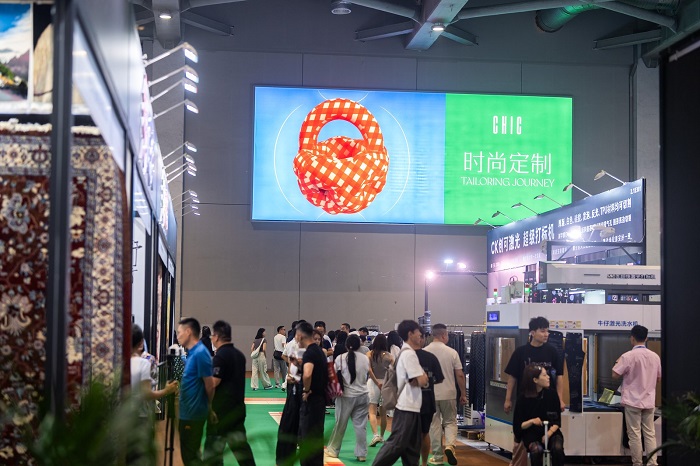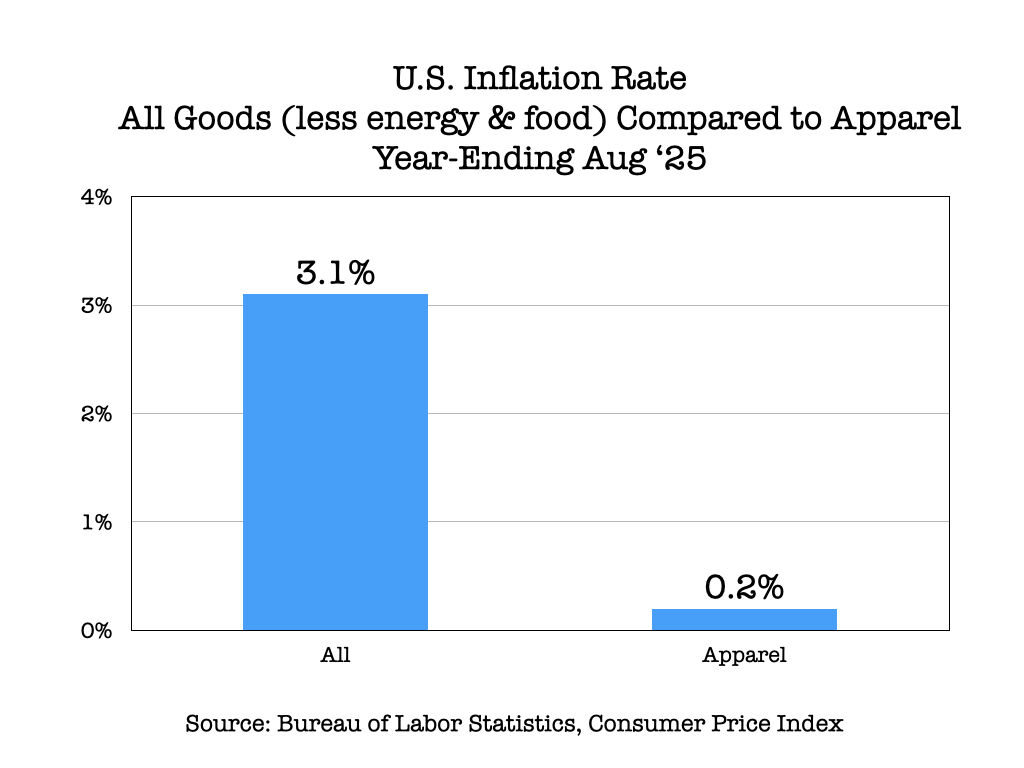FW
Cotton Council International is a non-profit that promotes US cotton fiber and manufactured cotton products with its Cotton USA mark.
With more than 60 years of experience, CCI’s mission is to make US cotton the preferred fiber for mills, manufacturers, brands, retailers and consumers.
While cotton has long been understood as a high-quality, reliable fiber, this is particularly true for US cotton, which doesn’t have the same quality and pest issues as other major cotton producing countries.
The US cotton industry has specific goals to be achieved by 2025. These are: reducing the amount of land needed to produce a pound of cotton fiber by 13 per cent; reducing soil loss by 50 per cent in balance with new soil formation; increasing water use efficiency by 18 per cent; reducing greenhouse gas emissions by 39 per cent; increasing soil carbon in fields by 30 per cent; and reducing energy to produce seed cotton and ginned lint by 15 per cent.
Consumers are becoming more aware how everyday choices impact the world around them. Fast fashion has made a big contribution to the rise of synthetic, manmade fibers that are cheap to manufacture, though not easily recycled. Synthetic fibers such as polyester and acrylic damage the environment by releasing hundreds of thousands of tiny synthetic particles in every wash.
An association of spinning mills in Tamil Nadu undertakes counseling sessions for workers. The association represents more than 650 mills.
The counseling sessions will help the young talent of the textile industry to release their work-related stress and deal better with the situation. They are also being encouraged to report harassment at the workplace.
Dindigul has set up a sanitisation workshop to help improve the conditions in up to 200 spinning mills.
Garment and textile workers in the textile hub of south India face severe pressures of work, trauma, ill-treatment and sexual harassment.
The workforce, majorly represented by young women, is compelled to work for long hours and forced to live in unauthorised hostels. There have been a series of deaths in textile factories and hostels. In the last three months, 23 such deaths were reported in Tamil Nadu. Many of these workers live away from their homes to earn a livelihood and support their families.
Tirupur and Erode districts, collectively known as the Textile Valley of India, where the bulk of the industry is located, have reported ten deaths.
Often death cases are not investigated and the cause remains uncertain. Families say among the dead are those who have ended their lives.
Nigeria is strengthening the competitiveness of the cotton value chain through enhancing capacities of stakeholders, developing and improving market infrastructure, providing jute bags to prevent polypropylene contamination, improving and upgrading ginneries and extending services/training of farmers and farmers’ empowerment.
The investment climate and the fiscal regime will be removed. Tax on equipment and inputs will be removed. An industry wide tax holiday will be applied.
The development of the sector will be fast tracked across the entire value chain. Capacity building and skills development will be attended to. An export promotion strategy will be devised.
Over 20 tons of certified cotton seeds as well as 1.5 tons of foundation seeds will be released to cotton farmers in the country for the farming season.
The textile industry was one of the booming sub-sectors of the Nigerian economy in the post independence years.
Driven by locally grown cotton and with a huge demand for clothing by a fast growing population, it provided direct and indirect employment to hundreds of thousands of Nigerians for several decades.
Between 1985 and 1991, Nigeria’s textile industry recorded an annual growth of 67 per cent. In that period textile companies numbered around 180, employing about a million people, and accounting for over 60 per cent of the textile industry capacity in West Africa.
For the first quarter The Children’s Place net sales fell 0.1 per cent. Comparable retail sales decreased 1.8 per cent. Adjusted operating income in the first quarter of 2018 was 5.8 per cent of net sales.
Gross margin rate in the quarter was also negatively impacted by the increase in penetration of the digital business to 26 per cent from 23 per cent last year. The company’s digital business operates at a lower gross margin rate due to higher fulfillment costs but is accretive to operating margin. The negative comp also resulted in deleverage of fixed expenses.
Gross margin rate was positively impacted by the reclassification of certain items due to the new revenue recognition rules.
The Children’s Place is the largest pure-play children’s specialty apparel retailer in North America.
Adjusted operating income in the first quarter of 2018 was 5.8 per cent of net sales, deleveraging 530 basis points compared to last year. Adjusted tax rate was negative for the quarter versus positive 25.7 per cent last year, primarily due to the impact of the accounting rules related to the income tax impact on share base compensation and the impact of the lower corporate tax rate.
The company closed 12 stores and did not open any stores during the first quarter of 2018.
Maria Borromeo is president of Hudson Jeans. She brings strategic leadership and experience with a record of success of growing and presiding over a brand from its inception.
Hudson Jeans belongs to the Differential Brands Group, which has a portfolio of other global consumer brands like Robert Graham and SWIMS.
Under Maria’s leadership, the company looks forward to maximizing the growth potential for Hudson not only through the implementation of a strategic vision that aligns with the core Hudson culture and values, but also capitalizing on new product and marketing initiatives and strengthening the brand’s digital and direct-to-consumer strategy.
Prior to joining Hudson, Borromeo was the co-founder and CEO of Thakoon, a global luxury brand. Borromeo successfully led all aspects of the business’s development, culminating in its acquisition and shift to a direct-to-consumer model. Borromeo devised and executed the long-term strategic vision for the brand while creating significant value by driving a steady and consistent growth trajectory. Borromeo has also worked with other leading global brands including Alexander McQueen and Etro.
Gerber Technology delivers industry-leading software and automation solutions that help apparel and industrial customers improve their manufacturing and design processes and more effectively manage and connect the supply chain, from product development and production to retail and the end customer.
Its digital solutions include the Yunique PLM product lifecycle management software as well as AccuMark, the industry-leading pattern design, grading, marker making and production planning software.
The digital solutions architecture uses common file structures. Data can easily be passed to the cut room where smart machines, like the Gerber spreader XLs series and the Gerber Paragon line of multi-ply Gerber cutters, can process the order with a simple barcode scan.
The Z1 single-ply cutter with Contour Vision performs automated vision-aided cutting. An automated scan-to-cut system processes rolls of custom printed textiles by automatically generating cut files to drive the process. The Z1 is enabled with Gerber connect, which allows data to be transferred to the cloud and service professionals to diagnose the cutter in real time ensuring maximum production efficiency.
Gerber aims at highlighting how digitisation can make purchase-activated manufacturing and mass customisation a reality. Manufacturers can digitise their process and increase their overall efficiency, while also reducing their inventory without impacting customer satisfaction or quality.
If a Cambodian garment factory were to close its owner has to pay a maximum of six months’ worth of compensation, based on employee seniority.
Garment manufacturers acknowledge the distress caused by the closure of a garment factory but say the compensation could hurt employers. They accept workers need to be protected, depending on how long they have been working at the company, but say the need to make companies pay all at once will create a new degree of financial burden for the employer and possibly other human resource management challenges. One warning from them is that such a provision could spark an influx of resignations in order to collect the maximum severance amount.
So employers suggest that they should be allowed to pay compensation in phases.
A related problem the country faces is that of employers who abandon their factories without paying workers.
Regulations are being drafted that will require all enterprises to pre-deposit money with the National Social Security Fund so that if factories close unexpectedly, the fund will have the ability to pay workers.
Factory owners pay a seniority bonus once a year to workers. That may be changed to having factories pay every two or three months instead.
Coloreel has sealed a partnership with Ricoh. They will set up a thread coloring unit for the embroidery industry.
Ricoh will build the sub-system for the colorisation process using their long experience in the world of inkjet printing and combine it with Coloreel’s new technology for colorisation.
Coloreel is based in Sweden. Ricoh is an electronics company.
The Coloreel technology enables high-quality instant coloring of textile thread while it is in textile production. The first product to be launched based on this technology is a ground-breaking thread coloring unit that works with any existing industrial embroidery machine. By instantly coloring a white base thread during embroidery production, Coloreel enables complete freedom to create unique embroideries without any limitations in the use of colors.
Coloreel will start production in autumn 2018. Leading companies in textile, fashion and sportswear are standing in line to use the revolutionary product.
Coloreel and Ricoh have cooperated for several years. The partnership is a joint development effort to revolutionise the textile business.
The partnership with Coloreel further demonstrates Ricoh’s commitment to collaboration and pushing boundaries. It combines Ricoh’s history of driving innovation for over 80 years, commitment to customer needs and intent on becoming the analogue to digital transformation experts in industrial process.
From January to April, Coats’ core thread business grew four per cent as key Asian markets performed strongly. The Performance Materials business grew by 19 per cent year-on-year, with four per cent organic growth and a 15 per cent contribution from the acquisition of Patrick Yarn Mill.
Organic growth in Performance Materials was underpinned by continued double-digit growth in hi-tech end uses (for example, flame retardant yarns), with some weakness in certain traditional end use segments in North America.
Crafts sales declined four per cent on a CER basis. This was due to the North American business, where market conditions remained tough, alongside the adverse impact in the period of the introduction of own-label hand knitting products at a major customer.
Coats is the world’s leading industrial thread manufacturer and a major player in the Americas textile crafts market. At home in more than 50 countries, Coats employs 19,000 people across six continents.
Sales growth for the group of eight per cent in the period was above the CER growth of five per cent due to the dollar weakening against certain key trading currencies, for example, the Chinese, the Indian and the Mexican.
The group continues to perform well, and anticipates delivering 2018 full year results in line with management’s expectations.
Production at Cifra, based in Italy, is up 72 per cent. The company does knitwear based on the cutting-edge Warp Knit Seamless technology.
With a daily production capacity of 10,000 pieces and exclusive know-how, Cifra has become a leading business for both design and production volumes. With a design department equipped with ten CAD units, the group develops new customized models every day for major worldwide brands in both the fashion and sports sectors.
Among its customers are Adidas, Lululemon, Wolford and Calzedonia. In 2018, thanks to the athleisure trend many new incoming customers such as Under Armour and Gap are expected. Cifra has also been developing new seamless warp knit products in merino wool for some of Europe’s leading brands. These merino wool products are in the collections of leading brands for both sport and fashion.
Research is being currently focused on innovative fibers: natural, bio-based and recycled at the service of an ever increasing environmental sustainability issue.
The Italian company has an innovative approach to seamless garment manufacture using double needle bar jacquard raschel knitting machines.
Cifra designs and produces seamless socks, tights, pantyhose and seamless garments for intimate apparel, active wear, body shapers, posture garments and swimwear for leading retailers and brands.












